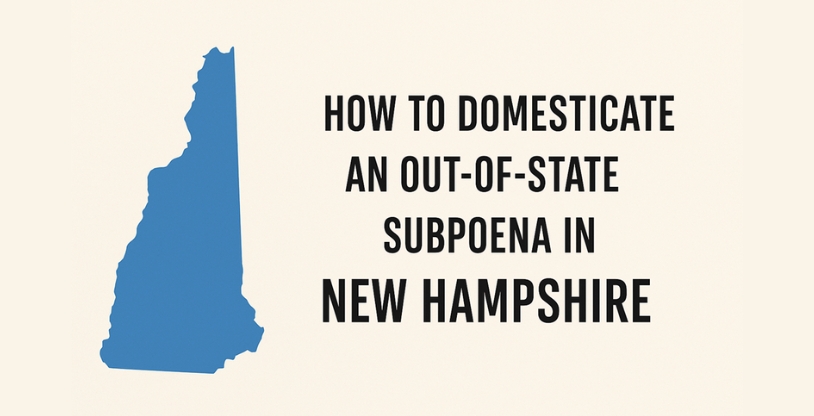In New Hampshire, out-of-state subpoenas are domesticated through RSA 517:1 and the Uniform Foreign Depositions Law. A foreign court must issue a Commission, Order, or Letters Rogatory authorizing deposition, testimony, or production of records in New Hampshire. That document allows a local justice of the peace or notary public to issue a subpoena under the New Hampshire Rules of Civil Procedure. Countrywide Process provides the subpoena, works with New Hampshire authorities to ensure proper issuance, advances fees, arranges service via vetted process servers, and returns proof of service with online tracking.

Countrywide Process
September 02, 2025
Unlike most states, New Hampshire has not enacted the Uniform Interstate Depositions and Discovery Act (UIDDA). Instead, the state follows the Uniform Foreign Depositions Law, codified in RSA 517:1, which requires a more formal approach to domestication. Attorneys must obtain authorization from the court where the case is pending, which then issues a Commission, Order, or Letters Rogatory allowing discovery to occur in New Hampshire.
The court where the underlying case is pending (in another state) must issue a Commission, Order, or Letters Rogatory. This is a formal request authorizing the taking of depositions, testimony, or production of documents in New Hampshire.
That Commission authorizes a justice of the peace or a notary public in New Hampshire to draft and issue a subpoena that complies with the New Hampshire Rules of Civil Procedure.
The authorized New Hampshire official issues a subpoena requiring the person or entity to:
The subpoena is then served in accordance with New Hampshire law. Countrywide Process coordinates service through vetted professional process servers, ensuring compliance and timely delivery.
Once issued, the subpoena carries the same force and penalties as if it were issued directly by a New Hampshire court in a local matter. Motions to enforce, quash, or modify are made in the New Hampshire court handling the discovery.
Under RSA 517:1, any person in New Hampshire can be compelled to provide deposition testimony or documents in aid of a foreign proceeding, provided the correct Commission or Letters Rogatory has been issued. This statute is the cornerstone of New Hampshire’s Uniform Foreign Depositions Law.
Let Countrywide Process handle your New Hampshire subpoena domestication—ensuring compliance with RSA 517:1 and the Uniform Foreign Depositions Law.
Need help with any of our services ? Contact Countrywide Process LLC now for expert assistance! Call 1-888.962.9696 or email us at info@countrywideprocess.com for a free quote today. Don’t wait— get the support you need now!
No. New Hampshire has not enacted the Uniform Interstate Depositions and Discovery Act (UIDDA). Instead, it follows the Uniform Foreign Depositions Law under RSA 517:1.
The foreign court must issue a Commission, Order, or Letters Rogatory authorizing deposition, testimony, or document production in New Hampshire.
A justice of the peace or notary public in New Hampshire issues the subpoena once authorized by a Commission or Letters Rogatory.
No. It must first be authorized by a Commission or Letters Rogatory under RSA 517:1 and then reissued as a New Hampshire subpoena.
It must be served under New Hampshire law. Countrywide Process uses vetted New Hampshire process servers to ensure compliance.
RSA 517:1 governs foreign subpoenas in New Hampshire under the Uniform Foreign Depositions Law.
Countrywide Process provides a copy of the issued subpoena, proof of service, and online status updates.